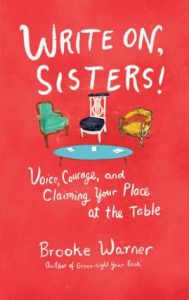Brooke Warner’s Write On Sisters! Excerpt
 Brooke Warner, founder of Indie Publisher of the Year 2019 She Writes Press, shines a light on the ever-present obstacles women writers face in her new book Write On Sisters!: Voice, Courage, and Claiming Your Place at the Table (August 27, She Writes Press). Brooke draws upon research, anecdotes and her personal experiences in the book publishing industry to show the inequality present in this field, then provides support to overcome these hurdles.
Brooke Warner, founder of Indie Publisher of the Year 2019 She Writes Press, shines a light on the ever-present obstacles women writers face in her new book Write On Sisters!: Voice, Courage, and Claiming Your Place at the Table (August 27, She Writes Press). Brooke draws upon research, anecdotes and her personal experiences in the book publishing industry to show the inequality present in this field, then provides support to overcome these hurdles.
We are delighted to feature this excerpt!
Women are half the world’s population, but we do not have an equal voice in the political arena, when it comes to who gets published, or in journalism, where women are still too often relegated to softer beats.1 Despite measured gains for women in terms of education and employment, the gender gap—“the difference between women and men as reflected in social, political, intellectual, cultural, or economic attainments or attitudes”—is as wide as it’s ever been. In her book Men Explain Things to Me, 8 Write On, Sisters! Rebecca Solnit wrote, “Women fight wars on two fronts, one for whatever the putative topic is, and one simply for the right to speak, to have ideas, to be acknowledged to be in possession of facts and truths, to have value, to be a human being.” Women today are fighting as we have historically—for equal representation, for our right to be believed and to be heard and to be read. For our place at the table.
It doesn’t matter whether you’re writing fiction or memoir or poetry or self-help or children’s books—the personal is political. This was a rallying slogan from the second-wave feminist movement in the United States, and it’s relevant to women writers of all stripes because the political conditions in which we live affect women’s voices. Women’s voices are at the center of some of our most recent, gripping national firestorms: the #MeToo Movement, Christine Blasey Ford’s Senate Judiciary Committee testimony against Brett Kavanaugh, Stormy Daniels’s 60 Minutes interview and tell-all book, and much more.
Because women are too often silenced, because we recognize the effort to silence and the impact of silencing, we inherently bring personal conviction and values to our writing. Audre Lorde, poet, feminist, and civil rights activist, wrote, “When we speak we are afraid our words will not be heard or welcomed. But when we are silent, we are still afraid. So it is better to speak.” In her activism, she gave voice to women everywhere, particularly to women of color, who have faced sexism just like their white counterparts, but also racism, stereotyping, undermining, and marginalization of their voices.
Writing is self-expression, and as such, when we Introduction: This Is Our Time 9 write we give voice to what we think, what we care about, and who we are. When we read a book—or even a post—we take a walk inside the innermost recesses of the author’s mind, welcomed into a place so private that the words we read on the page may be words the author has never uttered aloud. How powerful—and intimate— is that?
Author Dani Shapiro has said that voice is courage. As a publisher of women’s books and a writing coach who works to support people to express themselves on the page, I often think about this most simple of definitions. So many authors struggle with voice, thinking it’s something they have to find or cultivate or grow into. Others cower once they begin a writing project, writing to the wrong audience, tucking their tails between their legs as they abdicate their authority—to the peers they imagine will judge them, the family members they suspect will never forgive them, the critics they conjure up in their minds. The very act of curbing what we want to say for fear that it might not land well with others is the first step we take in turning over our power—and women writers do this more than men.
I’ve spent the past two decades working with authors, most of them women. I have enough experience with male authors to be able to compare. Yes, men encounter self-doubt. They worry what others will think. They censor themselves, too. But the degree to which women grapple with their doubts, fears, inner critics, outer judges, and so much more is arresting. It’s possible that women just talk about what cripples them more, but I don’t think so.
The culprit is a little thing called conditioning, which in psychological terms is learning that happens 10 Write On, Sisters! as a result of responses to our actions. The first half of this book examines the four main forms of conditioning that hold women back: historical, cultural, economic, and emotional. As recently as the 1960s and ’70s, girls were regularly steered out of intellectually rigorous career choices, encouraged to be secretaries and nurses and assistants. Women who pushed to be part of the conversation were considered uppity, brazen, rude. They still are. Where women’s rights are concerned, we’re still just emerging from the womb. The #MeToo movement has shed light on a disturbing revelation that most—if not all—women go through life dealing with bouts of feeling emotionally unsafe, walking on eggshells, ignoring or denying their better judgments, feeling as if they have to swallow whatever’s dished out, realizing that calling men out for bad behavior will only make them seem as if they’re oversensitive or overreacting. Many women still earn less than men, and even those women who have means struggle to prioritize or assert themselves financially when it comes to their creative pursuits.
It takes incredible stamina to face these kinds of resistance and keep pushing forward. Women writers experience resistance in spades, in the form of discouragement, of not being given the same opportunities as men, of having to weather the sexism of the writing world, of being systemically silenced. Given that women face these kinds of challenges disproportionately, we have to give ourselves props for our persistence. Yes, we can look to the past to see how much we’ve overcome. That so many women write, that we express out loud, that we publish our truths, are signs of our resilience and Introduction: This Is Our Time 11 strength—and a repudiation of a system that’s worked hard to keep women’s voices unheard.
WRITE ON, SISTERS!
 Write. Publish. Amplify.
Write. Publish. Amplify.
For any of us, this starts with voice and the courage to say what’s true. For women, it also involves overcoming historical and social conditioning and getting out of our own way.
Write on, Sisters! is a clarion call to women to write, to speak and be heard, to claim their place at the table, and to recognize the myriad influences—historical, cultural, economic, emotional—at play in how women’s writing is seen and how women express themselves.
Inside these pages, Brooke Warner draws upon research, anecdotes, and her personal experiences from twenty years in the book publishing industry to show how women’s writing is still discounted and less valued than men’s writing, then provides support to overcome these challenges.
Write On, Sisters! is for women writers ready for the next revolution.
Websites:
www.writeyourmemoirinsixmonths.com
Social media:
http://twitter.com/brooke_warner
http://facebook.com/warnercoaching/
https://www.linkedin.com/in/warnercoaching
https://www.pinterest.com/warnercoaching/
https://www.youtube.com/warnercoaching
Category: Contemporary Women Writers, How To and Tips























